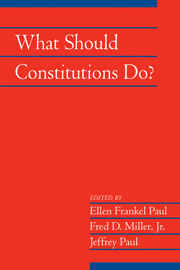Book contents
- Frontmatter
- Contents
- Introduction
- Acknowledgments
- Contributors
- What Are Constitutions, and What Should (and Can) They Do?
- Constitution and Fundamental Law: The Lesson of Classical Athens
- Contract, Covenant, Constitution
- Constitutionalism in the Age of Terror
- The Liberal Constitution and Foreign Affairs
- Do Constitutions Have a Point? Reflections on “Parchment Barriers” and Preambles
- The Origins of an Independent Judiciary in New York, 1621-1777
- Foot Voting, Political Ignorance, and Constitutional Design
- Pluralist Constitutionalism
- Deliberative Democracy and Constitutions
- The Constitution of Nondomination
- Can We Design an Optimal Constitution? Of Structural Ambiguity and Rights Clarity
- Index
Foot Voting, Political Ignorance, and Constitutional Design
Published online by Cambridge University Press: 05 June 2012
- Frontmatter
- Contents
- Introduction
- Acknowledgments
- Contributors
- What Are Constitutions, and What Should (and Can) They Do?
- Constitution and Fundamental Law: The Lesson of Classical Athens
- Contract, Covenant, Constitution
- Constitutionalism in the Age of Terror
- The Liberal Constitution and Foreign Affairs
- Do Constitutions Have a Point? Reflections on “Parchment Barriers” and Preambles
- The Origins of an Independent Judiciary in New York, 1621-1777
- Foot Voting, Political Ignorance, and Constitutional Design
- Pluralist Constitutionalism
- Deliberative Democracy and Constitutions
- The Constitution of Nondomination
- Can We Design an Optimal Constitution? Of Structural Ambiguity and Rights Clarity
- Index
Summary
INTRODUCTION
The strengths and weaknesses of constitutional federalism have been debated for centuries. Similarly, we have had centuries of debate over the extent to which there should be constitutional constraints on the scope of government power more generally. But one major possible advantage of building decentralization and limited government into a constitution has been largely ignored in the debate so far: its potential for reducing the costs of widespread political ignorance.
The argument of this essay is simple, but has potentially far-reaching implications: Constitutional federalism enables citizens to “vote with their feet,” and foot voters have much stronger incentives to make wellinformed decisions than conventional ballot box voters. The same goes for limits on the scope of government that enable citizens to vote with their feet in the private sector.
The informational advantages of foot voting over ballot box voting suggest that decentralized federalism can increase both citizen welfare and democratic accountability relative to policymaking in a centralized unitary state. Since at least the pioneering work of Charles Tiebout, scholars have analyzed foot voting extensively, but its informational advantages over ballot box voting have largely been ignored.
These advantages are important both for those who believe that political ignorance is instrumentally harmful because it undermines democratic accountability in government, and for those who value democratic control of public policy for its own sake. Widespread political ignorance undermines each of these potential benefits of democratic government.
- Type
- Chapter
- Information
- What Should Constitutions Do? , pp. 202 - 227Publisher: Cambridge University PressPrint publication year: 2011
- 1
- Cited by

